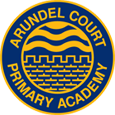To be Respectful
To be Independent
To be Inclusive
To be Safe
To be Kind
Religious Education
Curriculum Statement- Religious Education (R.E) at Arundel Court
Intent
At Arundel Court we are privileged to have such a wide and diverse range of cultures and beliefs. Through our teaching of R.E. we want to expose the children to the idea that although we are all different we all have commonalities within us all. Through the teaching of concepts, we are introducing the children to how we all might be the same and then how some people might see the world differently. As the children progress through the school we build on the concepts to develop a more religious understanding of why and how certain faiths embrace different beliefs.
Christianity is at the forefront of our curriculum and we have strong links with our church community. Bearing in mind our diverse community we also teach Hinduism in KS1 and Judaism and Islam in KS2.
We want our children to always accept the differences in the world around us and how we can find similarities in many parts of our lives and of religious lives.
Implementation
We follow the Hampshire syllabus - Living Difference - which follows the idea of teaching different religious ideas through concepts. To ensure that the building blocks are secure for the children as they move through the school the staff ensure they plan using the whole school concept grid. The specific teaching of concepts over time ensures a clear and concise order of learning. The teachers often teach R.E. on a weekly basis and build on the previous learning week by week.
R.E. has strong links in our local community even more so during this time. We are showing the community that we are still here celebrating with them. We do this through our displays at St. Faith’s church. We have remembered the fallen through our remembrance art work and will celebrate the joy of Advent by creating a display of light for the community to see.
Impact
Through our teaching and community engagement we hope that the children:
Will develop a clear understanding of the concepts and how this can be seen in their own lives. They will also have knowledge of how these ideas can be developed in to religious ideas and beliefs. We want our children to embrace the diversity of the community in which we live and that differences can also highlight our similarities.
Withdrawal from RE
Parental right of withdrawal from RE was first granted in 1944 when curricular RE was called ‘Religious Instruction’ and, as such, had connotations of induction into the Christian faith. RE is very different now. It takes account of world faiths and non-religious world views so that children can learn about and from religious traditions without being inducted into those traditions. In the UK, 70+ years later, parents still have the right to withdraw their children from RE on the grounds that they wish to provide their own RE. This RE provision will be the parents’ responsibility. This right of withdrawal exists for all pupils in all types of school, including schools that do and do not have a religious designation. Students who are aged 18 or over also have the right to withdraw themselves from RE. Parents can also exercise the right to withdraw their child from part of RE, and can do so without giving any explanation.
As schools act in loco parentis, a school continues to be responsible for the supervision of any child withdrawn by its parents from RE unless the child is lawfully receiving religious education elsewhere. Withdrawal time should not be used to teach other curriculum areas, e.g., additional mathematics sessions.
All requests should be made to the headteacher and a meeting arranged to discuss the request. A written record should be made of the request, any discussion and the outcome. The request should be reviewed annually. School can ask why the parent wishes to withdraw the child but cannot require a reason to be given. We will explain our approach to RE, which is not indoctrinating or nurturing children in a faith or promoting any particular belief system. RE makes a significant contribution to pupils’ spiritual, moral, social and cultural development.
